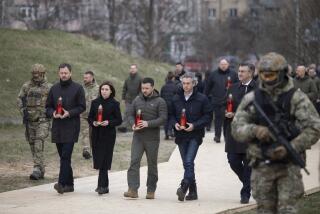Time Out Before Time’s Up
- Share via
The chief United Nations weapons inspector Monday spelled out Baghdad’s failures in persuasive detail. Saddam Hussein remains unwilling to avert war by complying with 12 years of U.N. declarations, the latest issued only two months ago. Even the Bush administration’s threats of military action, backed by the massing of tens of thousands of U.S. troops in the Middle East, have not swayed Hussein. The next move is Iraq’s.
Hussein can quit parsing a course of resistance based on exactly what he can get away with or he can expect to meet those troops head-on, an outcome desired by few. That means extending the inspectors’ mission, which allows time for Hussein to shift course, unlikely as that is, and for many kinds of pressure to build against him.
The inspectors’ presence itself makes it hard for Baghdad to continue its weapons programs. A limited extension of a few weeks or months would allow Arab nations to keep up pressure on Hussein to disarm or go into exile.
Should he refuse, Hussein’s own generals gain time to decide whether they want to risk their lives for a dictator with no support outside the country and probably little inside in the event of war. By paring down the issues, the U.N. inspectors provided a face-the-consequences clarity to those who might help prevent war.
Hans Blix, head of the U.N. Monitoring, Verification and Inspection Commission, said in his formal report to the Security Council that since inspections resumed in November after a four-year halt, Iraq had provided access to sites the inspectors wanted to visit but it had declined to say what happened to its stockpiles of chemical and biological weapons, including anthrax, and its missile production program. Iraq’s claims that it destroyed all U.N.-banned weapons are not supported by records, witnesses or other evidence.
The leader of the U.N. teams searching for nuclear weapons in Iraq, Mohamed ElBaradei, was easier on Iraq than Blix, in part because inspectors found no evidence of a revived nuclear program. But he hit on one of Iraq’s most damaging shortfalls: its refusal to let inspectors interview Iraqi scientists privately, as the U.N. demanded.
Blix’s inspectors deserve more time to open doors and dig into bunkers, as France, Germany and other nations have demanded. But history shows that when inspections in Iraq go on for too long, international support for inspectors wanes and Iraq puts up roadblocks until inspections become useless.
Blix has clarified what Iraq can do to prevent more devastation to its country and its people. The U.S. and its allies also have a better picture of Iraq’s failures. President Bush will dwell on those omissions in tonight’s State of the Union speech. At what point they add up to war will be the allies’ next big decision, one the White House should avoid making alone.
More to Read
Sign up for Essential California
The most important California stories and recommendations in your inbox every morning.
You may occasionally receive promotional content from the Los Angeles Times.













